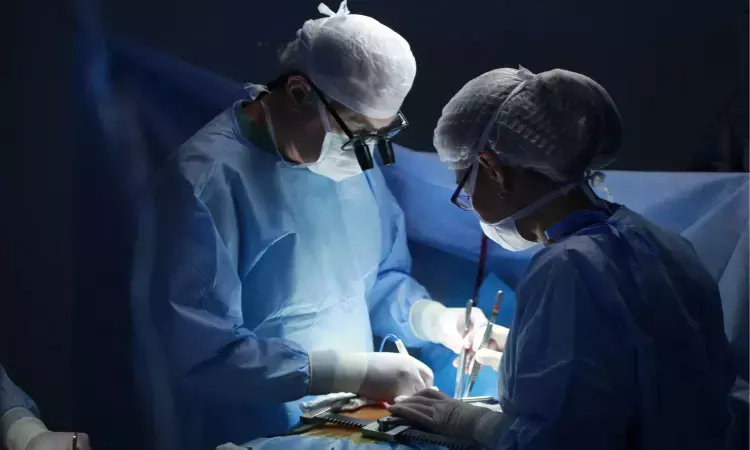- Home
- Medical news & Guidelines
- Anesthesiology
- Cardiology and CTVS
- Critical Care
- Dentistry
- Dermatology
- Diabetes and Endocrinology
- ENT
- Gastroenterology
- Medicine
- Nephrology
- Neurology
- Obstretics-Gynaecology
- Oncology
- Ophthalmology
- Orthopaedics
- Pediatrics-Neonatology
- Psychiatry
- Pulmonology
- Radiology
- Surgery
- Urology
- Laboratory Medicine
- Diet
- Nursing
- Paramedical
- Physiotherapy
- Health news
- Fact Check
- Bone Health Fact Check
- Brain Health Fact Check
- Cancer Related Fact Check
- Child Care Fact Check
- Dental and oral health fact check
- Diabetes and metabolic health fact check
- Diet and Nutrition Fact Check
- Eye and ENT Care Fact Check
- Fitness fact check
- Gut health fact check
- Heart health fact check
- Kidney health fact check
- Medical education fact check
- Men's health fact check
- Respiratory fact check
- Skin and hair care fact check
- Vaccine and Immunization fact check
- Women's health fact check
- AYUSH
- State News
- Andaman and Nicobar Islands
- Andhra Pradesh
- Arunachal Pradesh
- Assam
- Bihar
- Chandigarh
- Chattisgarh
- Dadra and Nagar Haveli
- Daman and Diu
- Delhi
- Goa
- Gujarat
- Haryana
- Himachal Pradesh
- Jammu & Kashmir
- Jharkhand
- Karnataka
- Kerala
- Ladakh
- Lakshadweep
- Madhya Pradesh
- Maharashtra
- Manipur
- Meghalaya
- Mizoram
- Nagaland
- Odisha
- Puducherry
- Punjab
- Rajasthan
- Sikkim
- Tamil Nadu
- Telangana
- Tripura
- Uttar Pradesh
- Uttrakhand
- West Bengal
- Medical Education
- Industry
Prehospital tourniquet use tied to improved mobility and limb preservation in vascular extremity trauma

Recent data suggest tourniquet use decreases shock without increasing limb complications, supporting its use in prehospital settings.
According to a recent study published in Surgery, researchers from Case Western Reserve University, Cleveland, said that Encouraging tourniquet use in the civilian setting may improve outcomes and reduce limb loss risk, as it has been associated with increased functional mobility and decreased delayed amputation.
The researchers in this study established the Hypothesis that Prehospital tourniquet use in vascular extremity trauma reduces delayed amputation and improves mobility compared to no prehospital tourniquet application.
The team evaluated adults with extremity vascular trauma at an urban Level 1 trauma centre (2016-2021). Outcomes included delayed amputation and mobility at discharge, measured by the 6 Clicks Basic Mobility Score. Higher scores indicated better mobility. Data on injury mechanisms, lactate, transfusions, mortality, and kidney injury were also collected. χ2, Fisher Exact and Wilcoxon tests were used to perform comparisons.
The results of this study could be summarised as follows:
- Of 232 patients, prehospital tourniquet application had no association with mortality or lactate level.
- The prehospital tourniquet application group had more transfusions, lower acute kidney injury rates, and fewer delayed amputations.
- Ninety-one patients, (45 in prehospital tourniquet application and 46 without it) were evaluated for "Moving between Bed and Chair" in the "6 Clicks" Basic Mobility Score. Those in the prehospital tourniquet application group had higher levels of independence.
In this study, they said we used the "6 Clicks" score to assess the differences in functional mobility between patients who had extremity vascular trauma with and without tourniquet use.
The use of Prehospital tourniquets was associated with fewer delayed amputations. The outcomes were favourable, including higher functional mobility and decreased delayed amputation.
The results of this study suggest that tourniquet use should be encouraged in the civilian setting as it improves outcomes and reduces limb loss risk.
Reference:
Thai, A. P., Tseng, E. S., Kishawi, S., Robenstine, J. C., & Ho, V. P. (2023). Prehospital tourniquet application in extremity vascular trauma: Improved functional outcomes. Surgery, 174(6), 1471–1475. https://doi.org/10.1016/j.surg.2023.08.002
BDS, MDS in Periodontics and Implantology
Dr. Aditi Yadav is a BDS, MDS in Periodontics and Implantology. She has a clinical experience of 5 years as a laser dental surgeon. She also has a Diploma in clinical research and pharmacovigilance and is a Certified data scientist. She is currently working as a content developer in e-health services. Dr. Yadav has a keen interest in Medical Journalism and is actively involved in Medical Research writing.
Dr Kamal Kant Kohli-MBBS, DTCD- a chest specialist with more than 30 years of practice and a flair for writing clinical articles, Dr Kamal Kant Kohli joined Medical Dialogues as a Chief Editor of Medical News. Besides writing articles, as an editor, he proofreads and verifies all the medical content published on Medical Dialogues including those coming from journals, studies,medical conferences,guidelines etc. Email: drkohli@medicaldialogues.in. Contact no. 011-43720751


